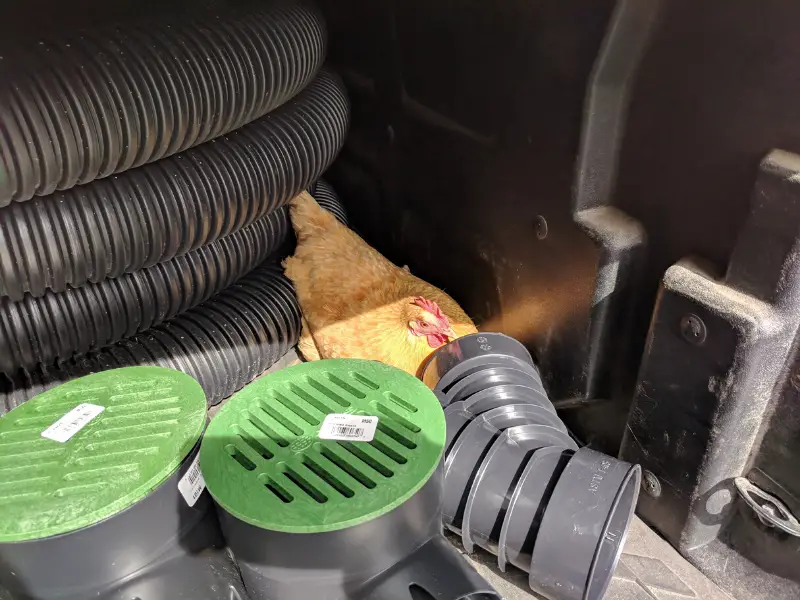Most people live their entire lives eating only white eggs. Grocery stores sell white eggs very cheap, restaurants use white eggs because they are cheap. Commercials on TV only show white eggs. It only makes sense that people have questions regarding brown eggs and the difference (if any) between them and white eggs.
Having eaten eggs all my life and having raised egg-laying chickens for the past several years, I’ll share my thoughts and knowledge that I’ve gained from all that experience.
What is the Difference Between White and Brown Eggs?
Technically the only real difference between white and brown chicken eggs is the pigment (or lack thereof) in the shell. The color of the eggshell is dependent on the breed of chicken. There are actually many other colors of chicken eggs such as blue, green, pinkish, and speckled that are all breed specific. The formation of eggs inside the chicken is the same for all breeds and the eggshell pigment is actually the last step of the process before she lays the egg. White eggs just skip the pigmentation step.
White eggs sold in grocery stores come from White Leghorn chickens. This has everything to do with economics and mass production. White Leghorns are very efficient at converting feed into eggs and will lay an egg every day. They can also tolerate the cramped conditions of egg production facilities better than other breeds.
Brown eggs come from breeds such as ISA Brown, Barred Rock, Rhode Island Red, and Buff Orpington. Some brown eggs are much darker than others which is still a trait of each particular breed. Our Barred Rock hens lay a much darker egg than our Buff Orpington hens do.
The real difference between eggs of any color is the quality and variety of the food that the hens eat and the amount of stress they are exposed to. If you were to take a White Leghorn and an ISA Brown allow them both to free-range and forage for most of their food while providing high quality supplemental feed you would end up with high quality eggs where the only difference was the color of the shell.
Why Are Brown Eggs More Expensive?

There are 3 reasons I believe that results in brown eggs being more expensive than white eggs.
- Chickens that lay white eggs cost less to house and feed. Large industrial chicken farmers use White Leghorns because of how efficient they are at converting food to eggs. Most of the brown egg laying hens are larger birds that require more feed to lay the same number of eggs.
- Marketers know that people expect “cage-free”, “organic” and “free-range” eggs to be brown and therefore are able to charge more. This gives the public a perception that all brown eggs are better for you and therefore cost more money. In reality, chickens that lay white eggs could easily be given organic feed and allowed to free-range everyday, but there is no way the average person will pay more money for white eggs than brown eggs.
- Small farms and homesteads that sell their chicken eggs locally usually have chicken breeds that lay brown eggs. Having colorful chickens wandering around the homestead is aesthetically pleasing to watch and enjoy as it is having fresh eggs for personal use and sale of extras. The price of those brown eggs is going to be more than the price of white eggs in the grocery store. It is not worth the homesteaders time to raise extra chickens to sell a few dozen eggs every week at 69 cents a dozen. People that want farm fresh eggs are willing to pay several dollars a dozen and expect those eggs to be brown.
Why Are Organic Eggs Brown?
We have touched on this briefly already. Brown eggs are not necessarily organic and not all organic eggs are brown. Because egg color is dependent on the breed of the chicken, any chicken could be feed organic feed and given the proper conditions to be classified as organic. Those eggs could be white, brown, blue, or green.
To be considered organic, the following conditions must be met:
- Only fed certified organic feed that contains no GMOs, synthetic fertilizers, pesticides or herbicides, or animal by-products.
- Kept in housing that is cage-free and have access to the outdoors.
- Free from antibiotics except during an outbreak of infection.
- Only allowed natural molting and not forced to molt.
This might paint a picture of little red hens wandering in the pasture behind a big red barn, but in most cases this is far from the truth. Mass produced organic egg facilities can be overcrowded and filthy with only a tiny little porch that is considered “outside” by the USDA which doesn’t mean that they are free-ranged or pasture ranged.
Are Brown Eggs Healthier?
The color of the eggshell has nothing to do with the nutritional value of the egg within. The nutritional value of the egg is determined by the quality of food that they eat, the variety of food such as bugs and insects and fresh greens, and the quality of life they lead.
The real question then becomes: are free-range or pasture raised eggs healthier? Most sources claim that pasture raised eggs are higher in Vitamins A, D, & E, and Omega-3 fatty acids and lower in cholesterol than conventional store bought eggs. I’ll link to two differing opinions below for additional reading:
I personally feel that a stress free chicken that is allowed to forage on a variety of plants and insects will produce a much healthier egg than a hen that has about 1 square foot to live her life in and is fed the cheapest type of feed that contains GMOs, pesticides, herbicides, growth hormones and antibiotics. Our own chickens here on the homestead free-range nearly everyday which provides our family with delicious healthy eggs.
What Do Brown Eggs Taste Like?
This one I can answer by my own experience. We have been raising egg-laying hens for several years now, but because we don’t force them to lay in the winter with timed lighting we occasionally have to buy eggs from the store.
For me a regular white store-bought egg has less flavor than our homestead brown eggs. In other words the brown eggs don’t taste any different, but have a bit more flavor to them. To the point where I really miss our fresh eggs in the winter after I’ve been eating store-bought for a few weeks.
I feel this is because of the fact that our hens have a more varied diet and are generally much happier than hens in a mass production facility. My mother had a couple of free-range chickens that laid white eggs and I remember those eggs being more flavorful too.
This I believe proves that it’s not the color of the eggshell but rather the diet and living conditions of the chickens themselves that lead to better tasting eggs.
Why Are Brown Eggs Harder To Peel Than White Eggs?
There are several reasons why it seems that a brown egg is harder to peel than a white egg when hard boiled:
- The age of the egg
- Whether the bloom has been washed off
- How thick the shell is
- The method used to cook
The Age of the Egg
First off if we are comparing a farm fresh brown egg from your own hens to a store bought white egg, it could be a matter of age of the egg. In general an older egg will peel easier than a fresh egg. White eggs purchased at the grocery store could be up to a week old or more before you even get them home. This fact gives typical white eggs a head start on being easier to peel.
Have They Been Washed
Another reason that is actually tied to the first reason is whether the bloom has been washed off the eggs. The bloom or cuticle as it’s also called is a thin protective coating found naturally on the egg as it’s laid. This coating keeps bacteria from entering the egg and also keeps moisture in.
Eggs sold in stores in the US are required by the USDA to be washed. This process washes the protective bloom off the egg which is why store bought eggs must be refrigerated. Without the bloom the egg evaporates some moisture which allows for the eggshell to be removed easier.
Most homesteaders don’t wash their fresh eggs which actually allows them to be left at room temperature for days or even weeks. The egg is much better protected with the bloom left intact. The downside is that farm-fresh brown eggs that haven’t been washed are harder to peel when hard boiled.
Here on our homestead we only wash eggs that are excessively soiled by the hens before we can collect them. These eggs are then refrigerated. Otherwise we try to not wash as many as possible to ensure freshness and wash them if necessary as we use them. Here’s an interesting read from the New York Times.
Shell Thickness
Healthy homestead raised chickens tend to have thicker shells because they are given plenty of calcium supplements and have a varied diet. Production facility chickens are given the bare minimum of food and supplements to produce eggs at the lowest possible cost.
Not only are they thicker but also stronger and thereby contribute somewhat to the difficulty of peeling. When the correct method for hard boiling is used these thicker stronger eggshells actually make it easier to peel because the eggshell comes off in larger pieces.
Hard Boiling Methods
There are so many different methods of hard boiling eggs and everyone claims their way is the best way. My wife Maria has tried nearly every single method because she was frustrated by shells that didn’t cooperate. Sometimes these worked okay for store bought eggs but not very well for our fresh eggs.
She tried the traditional boiling in water which led to adding vinegar or baking soda to the water, but those didn’t work. The next step was trying a little counter top egg cooker. Then we got an Instapot which we love for many reasons but not for hard boiling eggs.
Maria finally did find the solution to successful hard boiled eggs. She uses a steamer basket that you would use to steam vegetables and steams the eggs. She says to get some water boiling under the basket first then add your eggs. Steam with the cover on for about 14 minutes or so. You may have to experiment with the length of time for your setup and yolk preferences.
Are Cage-Free Eggs Better?

Probably not. This just means that instead of each individual hen being kept in separate cages, they are all just crammed into one larger space. This doesn’t mean they have access to the outdoors or pasture. It doesn’t mean their diet is any different.
What is the Difference Between Free-Range, Cage-Free Eggs and Regular Eggs?
Cage-free is just means they are not kept individually in cages, but rather kept as large groups in a larger facility. Regular traditional white eggs are from hens kept in individual cages. There really isn’t much difference if any in these eggs.
Free-range means that the hens have access to the outdoors. It doesn’t stipulate what that outdoor space must be. It could be a tiny little concrete pad. Free-range chicken eggs are probably not any different than cage-free or caged eggs.
Cage-free and free-range are both regulated by the USDA but the term pasture raised is not. If a carton of eggs in a grocery store says “pasture raised” the only validation one has is to actually do some research on the farm from which those eggs originate which can be a time consuming process. This article from Eater.com explains the terminology really well.

A homesteader or natural farmer would probably consider free-range or pasture raised to mean that their chickens are free to roam the farm or homestead eating a variety of fresh greens, bugs and worms all while living a relatively peaceful life.
If you are looking for truly pasture raised eggs than buying from a local farmer or homesteader where you can actually visit the farm where the chickens are kept to inspect for yourself is the best way to go.
Are White Eggs Dyed or Bleached?
White eggs are not dyed or bleached. They are naturally white because the chicken breed that most egg production facilities in the United States use is the White Leghorn which lays white eggs. The USDA requires that eggs be washed with warm water and a detergent. They are then sprayed with a chemical sanitizer and dried before packaging.
It’s also important to note that brown eggs are not dyed brown but are colored from pigments within the chicken before the egg is laid. The same is true for blue or green eggs from breeds such as Easter Eggers, Ameraucana, Araucana, and Cream Legbar chickens.
Summary

Personally I would rather have fresh eggs from my own backyard chickens regardless of what color they are. My second choice would be to find someone locally that raises their chickens in a humane way with plenty of variety in their diet. If I had to buy eggs from the store (which we occasionally have to do) I would just buy the regular white eggs as I don’t feel there is much difference in grocery store eggs that say “cage-free” or “free-range”.




